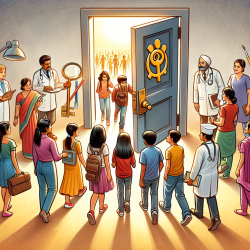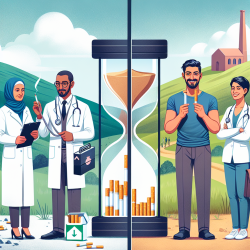Introduction
In the field of speech-language pathology, understanding the broader context of a child's life is crucial to creating effective therapeutic interventions. Recent research, such as the study titled "The experience of life events and body composition in middle childhood: a population-based study," provides valuable insights into how childhood experiences impact development. This blog explores the study's findings and offers guidance on how practitioners can use this knowledge to enhance their practice.
The Study at a Glance
The study conducted by Derks et al. (2021) examined the relationship between life events experienced in the first ten years of life and body composition in children. The researchers used data from 5,333 ten-year-old Dutch children, analyzing the impact of 24 different life events, including maltreatment and milder adversities, on body composition metrics like BMI and fat mass index.
While initial findings suggested a correlation between the number of life events and higher BMI, these associations became non-significant after adjusting for socioeconomic factors and parental psychopathology. This indicates that factors such as household income and maternal mental health play a more significant role in childhood obesity than previously thought.
Implications for Practitioners
For practitioners working with children, this study highlights the importance of considering socioeconomic and familial contexts when assessing developmental outcomes. Here are a few ways to integrate these findings into practice:
- Holistic Assessments: Incorporate questions about family dynamics and socioeconomic status into initial assessments. Understanding these factors can provide a more comprehensive picture of the child's environment.
- Collaborative Approach: Work closely with families to address socioeconomic challenges. This might involve connecting them with community resources or advocating for school-based support services.
- Focus on Resilience: Encourage resilience-building activities that help children cope with stress and adversity. Techniques such as mindfulness and social skills training can be beneficial.
- Further Research: Encourage ongoing research into the complex interplay of life events and developmental outcomes. This can help refine therapeutic approaches and improve child outcomes.
Encouraging Further Research
The findings from this study underscore the need for continued exploration into how childhood adversities affect development. Practitioners are encouraged to stay informed about new research and consider participating in studies that investigate these relationships further.
By understanding the nuances of how life events and socioeconomic factors impact development, practitioners can tailor their interventions more effectively, ultimately leading to better outcomes for children.
Conclusion
Incorporating the insights from this study into practice can help speech-language pathologists and other practitioners provide more targeted and effective support for children. By considering the broader context of a child's life, practitioners can better address the root causes of developmental challenges and foster resilience in their young clients.
To read the original research paper, please follow this link: The experience of life events and body composition in middle childhood: a population-based study.










